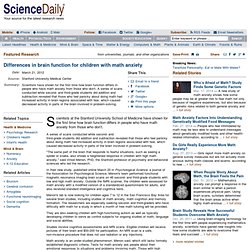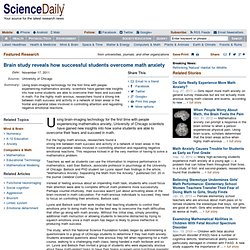

Unraveling 'Math Dyslexia' Although school has been back for less than a month, it is likely that many children are already experiencing frustration and confusion in math class.

Research at The University of Western Ontario in London, Canada could change the way we view math difficulties and how we assist children who face those problems. Daniel Ansari is an assistant professor and Canada Research Chair in Developmental Cognitive Neuroscience in the Department of Psychology at Western. He is using brain imaging to understand how children develop math skills, and what kind of brain development is associated with those skills. Research shows that many children who experience mathematical difficulties have developmental dyscalculia – a syndrome that is similar to dyslexia, a learning disability that affects a child's ability to read. Children with dyscalculia often have difficulty understanding numerical quantity.
They can't see the connection, for instance, between five fingers and the number '5'. Determine growth in math achievement. It's not how smart students are but how motivated they are and how they study that determines their growth in math achievement.

That's the main finding of a new study that appears in the journal Child Development. The study was conducted by researchers at the University of Munich and the University of Bielefeld. "While intelligence as assessed by IQ tests is important in the early stages of developing mathematical competence, motivation and study skills play a more important role in students' subsequent growth," according to Kou Murayama, postdoctoral researcher of psychology at the University of California, Los Angeles (who was at the University of Munich when he led the study).
Murayama and colleagues looked at six annual waves of data from a German longitudinal study assessing math ability in 3,520 students in grades 5 to 10. They investigated how students' motivation, study skills, and intelligence jointly predicted long-term growth in their math achievement over five years. Building a better math teacher. For years, it has been assumed that teachers -- specifically math teachers -- need to master the content they intend to teach.

And the best way to do this is to take courses beyond that content. Yet in a paper published June 23 in the Education Forum of the journal Science, Dr. Brent Davis of the University of Calgary says research does not support this common belief. There is little evidence that advanced courses in mathematics contribute to more effective teaching. "You know that feeling, when you try to explain to a child how to add multi-digit numbers, and you realize that it has become so obvious and sensible that you wondered why it ever seemed difficult?
" "That's what you want to be an expert, and that's what you want to guard against to be an effective teacher. Differences in brain function for children with math anxiety. Scientists at the Stanford University School of Medicine have shown for the first time how brain function differs in people who have math anxiety from those who don't.

A series of scans conducted while second- and third-grade students did addition and subtraction revealed that those who feel panicky about doing math had increased activity in brain regions associated with fear, which caused decreased activity in parts of the brain involved in problem-solving. "The same part of the brain that responds to fearful situations, such as seeing a spider or snake, also shows a heightened response in children with high math anxiety," said Vinod Menon, PhD, the Stanford professor of psychiatry and behavioral sciences who led the research. Menon's lab is now looking for children ages 7 to 12 in the San Francisco Bay Area for several brain studies, including studies of math anxiety, math cognition and memory formation. Studies involve cognitive assessments and MRI scans. Brain study reveals how successful students overcome math anxiety. Using brain-imaging technology for the first time with people experiencing mathematics anxiety, University of Chicago scientists have gained new insights into how some students are able to overcome their fears and succeed in math.

For the highly math anxious, researchers found a strong link between math success and activity in a network of brain areas in the frontal and parietal lobes involved in controlling attention and regulating negative emotional reactions. This response kicked in at the very mention of having to solve a mathematics problem. Teachers as well as students can use the information to improve performance in mathematics, said Sian Beilock, associate professor in psychology at the University of Chicago. The universe or the brain: Where does math originate? Math describes and predicts the world all around us -- from the helical structure of DNA to the spirals of galaxies.

But does this mean our world is inherently mathematical? The question has become a hot topic of debate as neuroscientists continue to uncover mathematical abilities we seem to be born with, and have pinpointed regions in the brain responsible for mathematical thinking. "[N]umbers are not properties of the universe, but rather they reflect the biological grounding for how people make sense of the world," says Rafael Núñez, professor of cognitive science at the University of California, San Diego and member of UCSD's Kavli Institute for Brain and Mind. Says Brian Butterworth, emeritus professor of cognitive neuropsychology at the Institute of Cognitive Neuroscience at University College London, "Numbers are not necessarily a property of the universe, but rather a very powerful way of describing some aspects of the universe.
" For more, visit: